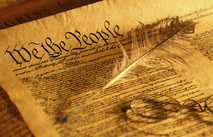
One might legitimately argue that both of the interpretations of the First Amendment given in our previous blog on how the Constitution precludes a Catholic State are relatively new in American history and that for the first century and a half, the US Supreme Court did not prohibit the state governments from preferring one denomination over others. Justice Joseph Story [1] who believed that “the right of a society or government to interfere in matters of religion will hardly be contested by any persons, who believe that piety, religion, and morality are intimately connected with the well being of the state, and indispensible to the administration of civil justice,” [2] saw the Constitution as prohibiting only the federal government from interfering in religious issues. “The situation… of the different states equally proclaimed the policy, as well as the necessity of such an exclusion. In some of the states, episcopalians constituted the predominant sects; in others presbyterians; in others, congregationalists; in others, quakers; and in others again, there was a close numerical rivalry among contending sects. It was impossible, that there should not arise perpetual strife and perpetual jealousy on the subject of ecclesiastical ascendancy, if the national government were left free to create a religious establishment. The only security was in extirpating the power. But this alone would have been an imperfect security, if it had not been followed up by a declaration of the right of the free exercise of religion, and a prohibition (as we have seen) of all religious tests. Thus, the whole power over the subject of religion is left exclusively to the state governments, to be acted upon according to their own sense of justice, and the state constitutions; and the Catholic and the Protestant, the Calvinist and the Arminian, the Jew and the Infidel, may sit down at the common table of the national councils, without any inquisition into their faith, or mode of worship.” [3]
Therefore, some may claim that the establishment clause would not violate the law of Christ if it were given the above interpretation.
However, there are two problems with this view. The first is that the federal government is no less subject to the requirement to accept the Catholic faith than are the state governments. No human institution is exempt from the laws of God for “all men, whether collectively or individually, are under the dominion of Christ.” [4] Second, Justice Story’s view precludes the establishment of a Catholic State by the federal government even if conditions in the United States permitted such an establishment. For example, if over 95% of the American people converted to traditional Catholicism and demanded that Congress pass a law establishing the Catholic Church as the official religion of the United States it would be prevented from doing so by the First Amendment unless the Constitution were amended to rid itself of the establishment clause.
[1] Joseph Story served as a Justice of the US Supreme Court from 1811 to 1845 and wrote Commentaries on the Constitution of the United States.
[2] J. Story, Commentaries on the Constitution of the United States 1865 (1833).
[3] Id. at 1873.
[4] Pius XI, Encyclical Quas Primas (1925) 18.
 RSS Feed
RSS Feed
